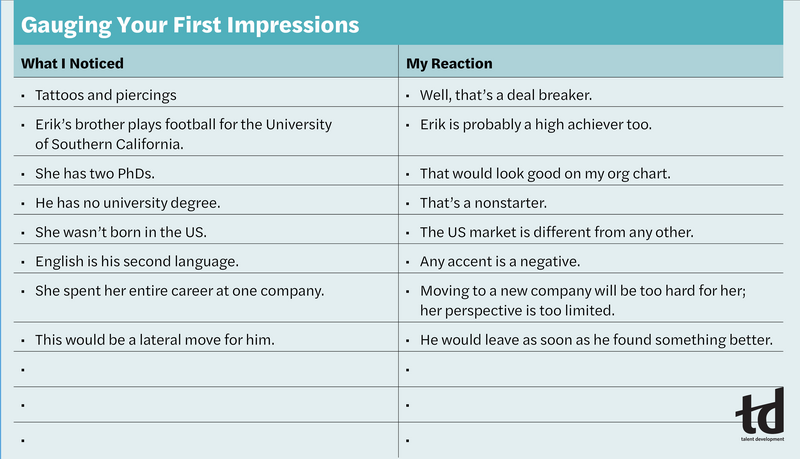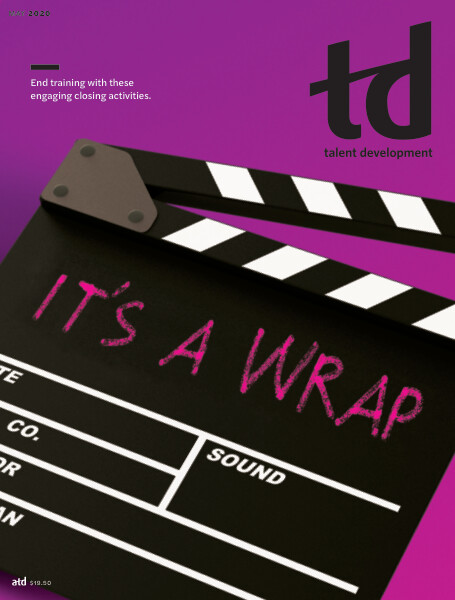TD Magazine Article
Beware of Faulty Filters in Your Hunt for Talent
Open minds close open positions.
Fri May 01 2020

Horace is driving a decrepit old car through a rural area. He brakes suddenly when another driver comes hurtling around a sharp bend in the road in a large Rolls Royce. The driver sees him, shouts "Pig!" at him, and drives past. "Cow!" he yells back in retaliation and heads around the bend himself, crashing head-on into the biggest pig he has ever seen.
If that old story elicited a chuckle, good. We hope it will lead you to wonder what caused Horace to mistake an innocent warning for an insult: Was it his assumption that the driver of an expensive car would view him with contempt? Did he have a previous experience driving through that neighborhood? Was it his bias against people who shout at motorists?
Yes, yes, and yes. Each of those is a mind filter.
If Horace had avoided those filters, kept an open mind, and viewed the situation through a less cloudy window on the world, he may have had a more informed reaction, been more receptive to the other driver's warning, and ultimately steered clear of the pig.
Unlikely as it may seem, that story provides a valuable lesson for executives and line managers looking to fill open positions. Why? Because Horace's filters are similar to the ones that can cause leaders to set inaccurate job requirements; create biased profiles of an ideal candidate; place unwarranted importance on one type of skill, education, or behavior over another; or inaccurately view and prematurely dismiss highly talented candidates.
In the words of writer Isaac Asimov, "Your assumptions are your windows on the world," and they make up the lens through which individuals view events, people, relationships, decisions, and so much more. As such, they help explain both what caused Horace to misinterpret the meaning and intent of "Pig!" and what leads executives and managers to sabotage their own talent hunts. But they do not address the more important issue of how to avoid the filters that cloud perception in the first place. The answer, however, is fairly simple. It starts with having an open mind.
An open mind is one that is free of the faulty filters, assumptions, biases, and partisan beliefs that can misshape opinions, skew attitudes, and cloud objectivity. In the corporate world, it is ostensibly valued, desired, and even demanded—too often by those who don't demonstrate it themselves. This may be because developing and maintaining an open mind requires work.
From our experience, we have distilled a few ideas for opening the minds of those who are trying to fill open positions.
Notice what you notice
One of the first steps toward an open mind is to develop an awareness of what may be closing it. A good way to begin is to simply notice what you notice. It's a practice you can exercise on the job and is a useful way to identify filters that could potentially prevent your neutral, objective consideration of potentially valuable additions to your team.
As you go about your day, pay attention to anything that stands out in your mind above others. Be aware of your first impressions and reactions—positive or negative—to certain words, smells, sounds, ideas, language, apparel, hair styles, labels, titles, and so on. See the table below for examples, and add your own observations and reactions.

If you are like most of our clients, you will discover a few reactions that could potentially—and faultily—affect one of your selection decisions. If so, what can you do to adjust them? One way is to use the table to record your key observations and reactions to the next candidate or resume you see, then answer these reflection questions:
Why did I notice what I noticed or react the way I did?
What alternative reactions could I have?
Would my colleagues react the way I did? Why or why not?
Would what I noticed impair the candidate's job performance in this role?
How valid is my reaction to what I noticed? Do I have data to support it, or is it a possibly faulty assumption?
Am I judging this person by a set of standards the individual does not share? If so, is it a set of standards that reflects my company's values, a set of standards that is relevant to the job requirements, or just my personal set of standards?
Ask more questions and question more answers
At every stage of a talent hunt, executives and managers risk looking through any number of faulty filters that could negatively influence their decision making and unnecessarily lengthen their search. As talent hunters, they are initially motivated but often in a hurry to answer key questions about the job opening. And filters, unfortunately, offer handy shortcuts.
As a result, answers to "What are the job requirements?," "What does the ideal candidate look like?," and "Where should we search?" tend to reflect those filters. And the more filters there are, the less information gets in. The less information there is, the faster managers can process it. The faster they process it, the sooner they can make a decision. And the sooner they decide, the quicker the job opening will close. Makes perfect sense, right?
Only until you fast-forward to the point where the original questions invariably morph into tougher ones such as "Why are there so few qualified candidates?," "Why didn't somebody mention this in the beginning?," and, ultimately, "Why is this taking so long?"
Sound familiar? If so, try asking the following questions before or during your search.
Whom should I consult before writing the job requirements and candidate profile? Inviting others to contribute to the "pre-search" could not only broaden your perception of what you need but also help clear up any unconscious filters you have in place. It also enables you to look beyond information that simply affirms what you already think.
Clearly, there are valid reasons for eliciting opinions and input from others in preparing job requirements and candidate profiles, but which others? Every situation is different, but here are some possible contributors to consider:
Team members. Ask them to describe the overarching team process the new hire will be part of and that individual's role in it.
Customers. If you are trying to fill a customer-facing role, who better to consult about job requirements than those who chose to be your customers?
Job analyst. If you have people whose role is to determine a position's duties and the nature of performance evaluation, by all means consult them.
Current job holders. These individuals may provide valuable insight into what their typical day looks like, their role relative to others in the process they're involved in, the key issues or problems they face, how to handle or avoid them, and more. You can even ask them how to revise the current job description to better reflect what's really happening in the role.
Your supervisor. This person provides a good reality check and a fresh set of eyes.
How many of my must-haves are there? The dictionary definition of must-have is "an essential or highly desirable item." So, which is it? Must-haves are excellent ways to limit your talent options.
Hard-and-fast candidate filters almost invariably leave you upstream without an or. Plus, the trip back to dry land can add hours or even days to your talent search. To avoid that, examine and add an or to your must-haves. For example, the candidate must:
Have experience in our industry or demonstrate how their other-industry experience can add value to our business.
Leap tall buildings in a single bound or leap smaller buildings but more of them.
Come from outside our firm or not.
Live close enough to be in the office every day or be willing to \[fill in the blank\].
Have worked in a startup or demonstrate an entrepreneurial mindset.
Have an MBA or rich business experience with demonstrated accomplishments.
Have worked in a publicly traded company or in a company that governed itself using the practices of a publicly traded company.
What are my assumptions about the ideal candidate and how realistic are they? Thinking that candidates can easily fit into neat classifications limits your thinking and makes it far too easy to eliminate potentially high-caliber people. It also causes the search to take longer than it should. Be honest with yourself: What more realistic requirement could you set?
What am I not seeing? Candidate interviews are where faulty filters most often rear their ugly heads. Open-minded people know they are not all-knowing. They realize their perception of someone is more complicated than they consciously realize, so they are more inclined to seek out and understand alternative perceptions. This effort itself expands their minds and leads them to re-examine opinions, assumptions, and filters—theirs and others'.
Remember that people and their experiences are nuanced, and this fact alone makes them worth noticing rather than dismissing. Ensure that your selection process involves more interviewers than yourself.
Why did I think that last candidate (or resume) was perfect (or awful), when no one else did? That is probably one of the best questions to ask if you want to uncover unconscious filters. Did you give the candidate more points for certain experiences than other interviewers did? If so, why? Did you give the individual fewer points for certain resume features than other screeners did? If so, why?
To help you avoid potential filters, try having someone remove the name, address, educational degrees, and age- and gender-indicating information from the next resume you scan. Then, after you've made a go or no-go decision, re-read it with the missing information included and see whether you discover anything interesting.
How important is it? The importance you place on certain characteristics can reflect a filter you don't even know you're using. Are the requirements you set critical to doing the job, doing the job well, or doing the job perfectly? Your focus on perfect versus very good may be a filter—and it could make a difference in how long it takes to fill an open position. A question closely related to that one is next.
Am I in more of a hurry than I need to be? Probably. One of our favorite axioms is "Crawl to conclusions." Here are some others: "Speed is inconsequential if you're headed in the wrong direction." "Good, cheap, or fast. Pick any two." "Speed kills."
Build to suit
We believe there is a must-have question to ask in any critical talent search, one that deserves to be called out separately: What would I do if I had to fill this position with a current employee?
If you are like most of our clients, that question sends chills up your spine. But the exercise of answering it can be critical in overcoming what we call the NIMBY filter. NIMBY is an acronym for the phrase "Not in my backyard" and is a characterization of resistance by residents to planned developments in their local areas. In our experience, it is also an attitude that is alive, well, and causing many organizations to miss some of their most promising—and easy-to-access—talent resources. And it is a filter that is easy to avoid. How? By planning developments in your local area.
Our client work suggests that too many of today's managers know more about job candidates' abilities than they do about their own workers. Therefore, start by becoming more familiar with your team members' current capabilities, potential, and career goals. Approach your employees with an open mind; discover and consider how to leverage their existing potential; and explore how each of them could be coached, trained, or provided with tools and experiences that could help them become the talent you will one day be searching for.
Filling open positions with current employees does not mean creating something out of nothing. It could simply mean building on property you didn't realize you had.
As vexing as the above questions may be, they will hopefully help you to develop more informed reactions, consider more options, re-examine your assumptions, become more receptive to potentially valuable talent, and ultimately steer clear of pigs in the road. On the other hand, if you have concluded that you have no faulty filters, we'll leave you with this final question: What were your initial assumptions of Horace upon reading the first sentence of this article? Why?

